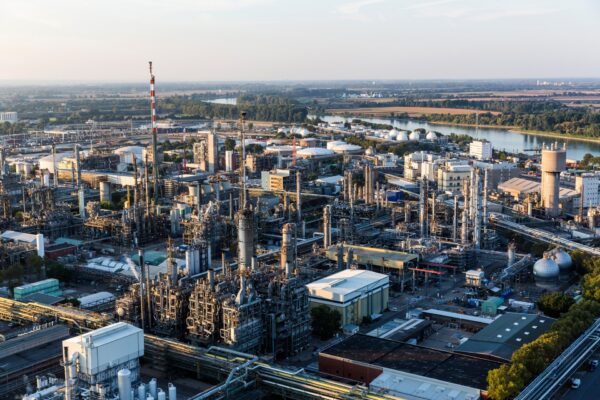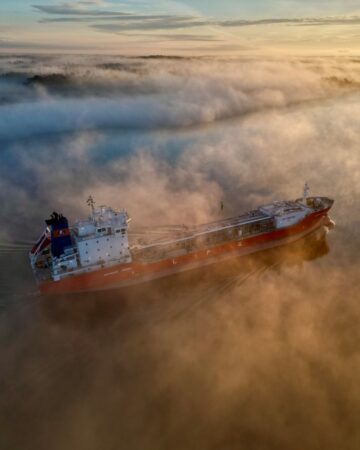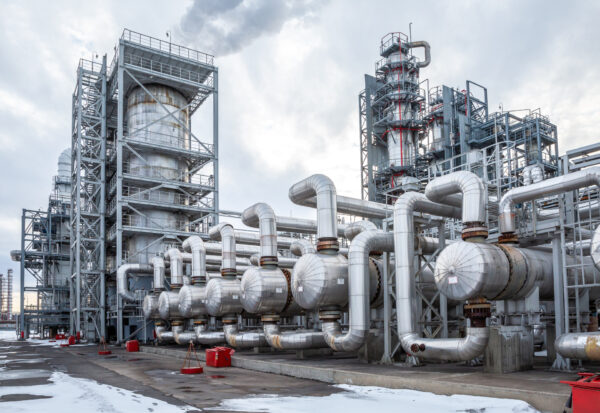

A leader in gas shipping services
Anthony Veder, established in 1937, acquired its first gas tanker in 1969.
As an integrated shipping company, Anthony Veder develops and enhances long-term customer relationships by offering a safe, reliable and flexible service using a wide range of high-quality gas carriers.
The group is involved in all segments of gas shipping, from LNG to Ethylene and LPG. Furthermore, the company provides comprehensive technical and commercial ship management services to third parties. Anthony Veder operates a fleet of 28 gas tankers. The Rotterdam-based shipping company employs over 1,000 people.
For more information, please visit www.anthonyveder.com
-
Anthony Veder is a trusted partner for major oil and energy companies in the world and prioritizes a safe work environment for its people. Being able to proactively identify and address issues with the cargo plant is critical to fulfilling those commitments to our customers and crew members.
Esther van der Voort — Reliability Manager, Anthony Veder -
Working closely with Anthony Veder, we transformed their planned maintenance effort to a predictive maintenance program, which helped assure the continual availability they’d promised customers
Chris Kramer — Corporate Customer Care Manager, I-care -
In the past, we looked at vibration measurements just before a major repair period – every 30 months. Now, we can look at asset performance monthly.
Esther van der Voort — Reliability Manager, Anthony Veder
Challenges
- Increase fleet reliability
- Prevent equipment issues
- Minimal tanker downtime
Keeping Petrochemicals Moving Globally
To increase the reliability and availability of Anthony Veder’s fleet of 28 gas tankers specialized in the transport of Liquefied Petroleum Gas (LPG), Liquefied Natural Gas (LNG) and Petrochemical gases, the company needed to be able to identify and resolve equipment issues before they happened.
Anthony Veder aims to be an ambitious leader in gas shipping service solutions, which means consistently having tanker capacity availability with minimal downtime is critical. Additionally, having a predictive vibration monitoring service tracks the performance of expensive rotating assets, such as cargo pumps and cargo compressors, would help Anthony Veder proactively manage its capacity, prevent damage and keep maintenance costs in line.
The ships in the Anthony Veder fleet have a cargo plant to control the temperature of the cargo (liquified gas). The cargo plant is a foundational factor affecting each vessel’s availability. Maintaining the cargo at the required temperature is critical to transporting liquified gases, the cargo plant is a critical factor in this. High temperatures can cause liquefied gas to expand and become gas, jeopardizing the ships’ safety and transport capacity.
Collaboration
- Proactive vibration measurements
- Single monitoring solution
- Assets from multiple manufacturers
- Scalable monitoring program
Seeking Out Proactive, Predictive Maintenance Approach
Originally, Anthony Veder was measuring assets’ vibration performance once every 30 months to plan the type of work that would be needed during each ship’s routine maintenance. The company instinctively knew that being able to proactively measure and manage assets’ operation within acceptable vibration ranges would help ensure the consistent availability of the capacity their customers wanted. Additionally, by resolving vibration issues quickly, Anthony Veder could prevent these issues becoming more impactful and expensive.
Anthony Veder contacted I-care to better understand how to maintain and monitor the performance of its ship-board industrial assets using vibration measurements. While many companies could monitor certain types of assets, Anthony Veder’s inventory posed a difficult challenge. Assets from multiple manufacturers are installed on the ships without fleetwide standardization. In addition to the variety of assets in use, the company wanted to monitor all the assets’ performance from a single monitoring solution, Anthony Veder also wanted a scalable asset monitoring program that would be easy to roll out and use across the fleet. A flexible solution that would allow the company to add new assets and new performance metrics to be tracked was important as well. Ideally, Anthony Veder’s asset monitoring partner would need to arrive on Day One with a deep understanding of the installed equipment and shipping.
“Anthony Veder made it clear to us from the beginning that they wanted to see measurably less downtime due to mechanical breakdowns,” said Chris Kramer, Corporate Customer Care Manager, I-care. “That’s where we focused at first, and today we are helping them improve several key operations in their predictive maintenance program.”
Solutions
- Single monitoring platform
- Expanding asset inventory
- One-ship pilot
- Early failure warnings
- 26 tankers monitored
Monitoring All Assets from a Single Platform
Anthony Veder chose I-care as its predictive maintenance partner for three key operational capabilities: being able to monitor any manufacturer’s asset from a single monitoring platform; the ability to accommodate a constantly expanding asset inventory; and the flexibility to adjust tracked performance metrics over time.
Dubbed Project PriMa (Dutch for “good”), the Anthony Veder/I-care asset performance collaboration began with a one-ship pilot, where a handheld data collection tool was deployed to measure and report selected asset performance metrics. I-care’s expert analysis of the collected data identified the potential for significant bearing damage and other performance-related issues before they happened. These early warnings allowed Anthony Veder to replace compressors before they failed, improving the ships’ availability and helping the company deliver on its promise of consistently offering shipping capacity.
Based on the success of the single-ship pilot, Anthony Veder instructed I-care to roll out data collection and asset monitoring on other assets in the cargo plants, including cargo pumps, and to expand monitoring coverage to a selection of their company vessels. More ships boarded the I-care solution later. Today, I-care oversees asset monitoring on 26 of Anthony Veder’s tankers.
Benefits
- Threshold-exceeding detection
- Improved reliability management
- Cloud-based performance dashboard
- Operational costs control
- Fleet availability ensured
Flagging Out-of-Range Performance
In addition to deploying its predictive maintenance service on the majority of Anthony Veder’s fleet, I-care is continuing to monitor the fleet for vibration maintenance issues and has begun working to improve the company’s reliability management efforts as well as its spare parts program. One aspect of asset operation that is of special interest to Anthony Veder is threshold-exceeding performance. I-care launched and manages above-threshold monitoring through resonance frequency testing, which continually tracks asset performance, alerting I-care whenever any asset operates above recommended thresholds. When an asset operates out-of-range, I-care flags the need for realignment to bring the asset’s performance back into an acceptable range.
Anthony Veder has taken its predictive asset maintenance to a new level by using an always –available, cloud-based dashboard to graphically display key performance metrics, such as failure distribution by business unit and type, “back to green” timing and status, assets with the most “red” alerts and most “green-to-red” status and complete asset history. This visual display summarizes critical performance metrics by asset group and business unit, using a simple traffic-light color system to help quickly identify performance issues.
For Anthony Veder, just-in-time maintenance prevents asset damage and helps to keep operational costs in line. More importantly, predictive maintenance ensures ships are available when the company’s customers need them. Delivering on its global promise to have capacity on demand means the world’s largest petrochemical producers can count on their products getting to where they need to be – even in the most remote locations of the world.
Ready to Scale Predictive Maintenance Across Your Operations?









